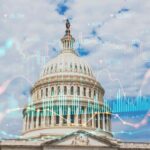While the stellar performance of many assets on both the stock market and the cryptocurrency markets has emboldened the bulls and diminished the bears, warnings of the coming crisis continue being spoken at times.
Indeed, there have been numerous predictions since the start of 2024, some believing in a highly predictable forthcoming inflation crisis, others believing that AI has generated a bubble set for bursting, and others still believing that though there is a bubble, only the FED could bust it.
Even the International Monetary Fund (IMF) recently chipped in and cautioned that U.S. economic growth is driven by unsustainable spending and borrowing.
Finally, with the popular ‘Fear & Greed Index’ returning to ‘fear’ by mid-June, Finbold decided to consult the most advanced model of OpenAI’s flagship artificial intelligence (AI) platform – ChatGPT-4o – about exactly when the next recession might start.
ChatGPT assesses the dangers of a recession
Having examined the current state of the economy, ChatGPT concluded that the cycle is indeed poised for the crash phase, albeit not imminently.
According to the AI, various risks have been accumulating over the recent years, significantly increasing the danger of a recession.
ChatGPT singled out several recent trends as particularly dangerous: inflation and interest rates, conflicts such as those in Ukraine, Gaza, and the West Bank, high corporate and national debt, precarity of emerging economies, and widespread technology adoption raising the risks of cyberattacks and rapid job loss.
When asked to identify the most vulnerable regions to this expected recession, the AI stated that developing countries are at a particular risk. It also repeatedly cited the Eurozone as unstable and even judged it to be a likely ground zero for the crash.
Elsewhere, ChatGPT concluded that the technology and healthcare sectors, along with countries wealthy in natural resources, are likely to be spared the worst of the crisis.
ChatGPT predicts when the next recession will start
When asked to consider and examine the highlighted factors to predict when the next recession might start, the AI settled for April 15, 2026. ChatGPT also predicted that the crisis would last between 18 and 24 months.
After taking into account the current size of the global economy and its likely future trajectory, the AI estimated the crash would reduce Earth’s total GDP by approximately $4.5 trillion in the worst-case scenario and by about $1.8 trillion should the crisis be mild.
ChatGPT analyzes what could trigger a recession
The request to provide the likelihood of the dire scenario playing out revealed some uncertainties in ChatGPT’s analysis. For starters, the AI estimated there is a 75% chance of a major crisis starting in 2026 or one of its adjacent years.
The platform also stated that inflation and interest rates are the most likely to trigger a recession and assigned a 70% probability to the scenario. The current geopolitical situation is also judged as risky for the world economy, and ChatGPT believes it has a 65% chance of starting a crash.
Finally, the AI estimated that debt levels and potential defaults have a 60% chance of triggering a recession.
Interestingly, although ChatGPT also assigned a likelihood of 60% that the crisis will originate in the technology sector, it repeatedly refused to place it among the top 3 likely causes.
It is worth pointing out, however, that ChatGPT’s analyses are commonly borderline technocratic as it frequently places sheer technological innovation at the forefront of any sensible strategy for humanity’s future.
Finally, when asked about the apparent paradox of simultaneously assessing the technology sector as risky and judging it as likely to be mostly spared the crisis, the AI stated it is highly risky in the short-term but very safe in the long run.









